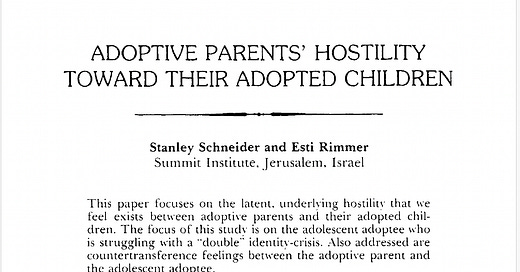In the 1980s, critical adoption studies were attempting to explain adoption dynamics and the struggles faced by adopted individuals and adoptive families through intrapsychic frameworks.
One such example is Stanley Schneider and Esti Rimmer’s Adoptive Parents' Hostility Toward Their Adopted Children.
Published through the Summit Institute in Jerusalem, Schneider and Rimmer focus on latent hostility between adoptive parents and the people they adopt, with particular focus on adolescence.
The adolescent adopted person, they argue, experiences a “double identity crisis,” grappling not only with the typical challenges of growing up but also with existential questions about their origins.
The authors propose that multiple layers of anger and aggression circulate within the adoptive family:
The birth parents’ anger at relinquishment.
The adoptive parents’ anger at infertility and the child as a symbol of that loss.
The adopted persons anger toward their parents and their adopters.
This tangled web, they argue, fuels emotional disturbances during adolescence, manifesting in destructive behaviours, identity confusion, and relational breakdowns.
Central to Schneider and Rimmer’s argument is the narcissistic injury suffered by adoptive parents, particularly mothers, due to infertility.
Adoption, they claim, doesn’t resolve this wound but exacerbates it. The adopted person becomes a living reminder of what the parents could not biologically achieve, triggering unconscious hostility.
The paper addresses sexuality in adopted adolescents, a subject that is barely discussed in critical adoption studies.
The authors argue that adoptive parents often struggle with their child’s emerging sexuality, in part because the incest taboo, rooted in biological kinship, is weakened in adoptive families, leading to heightened fears of sexual acting out, unconscious hostilities, and further strain within the family.
The paper suggests that female adoptees may use pregnancy as a form of acting out, asserting their fertility in contrast to their adoptive mother's infertility, and reversing the abandonment narrative by keeping their child.
This work has been criticised for failing to include the voices of adopted people, overgeneralising adoptive family dynamics, and omitting broader social and systemic contexts behind negative behaviours. The critiques suggest the need for more balanced, evidence-based research that centres diverse perspectives.
I believe this call for a more balanced perspective is itself problematic.
The broader social context consistently privileges the perceived social good of adoption.
There is nothing balanced on the adoption spectrum. Adopted people spend their lives within a legally distinct parallel system that governs their relationships and rights, particularly in areas like inheritance, citizenship, and identity.
Perhaps the loudest argument against the work is that Schneider and Rimmer treat adoption as inherently problematic.
Their critics say they risk reinforcing harmful stereotypes of adopted people as “troubled” and/or adoptive families as psychologically unstable.
However, I find the ongoing and underlying belief in the equivalence of the adoptological and biological family far more troubling.
There is nothing natural about human adoption. This lack of recognition of profound difference is at the heart of the dysfunction of adoption.
What do you think?
This hard-to-access paper is attached for paid subscribers.
Your support helps sustain this work, bringing critical adoption research and hidden histories into the light.
Keep reading with a 7-day free trial
Subscribe to Adoption Deconstructed to keep reading this post and get 7 days of free access to the full post archives.




